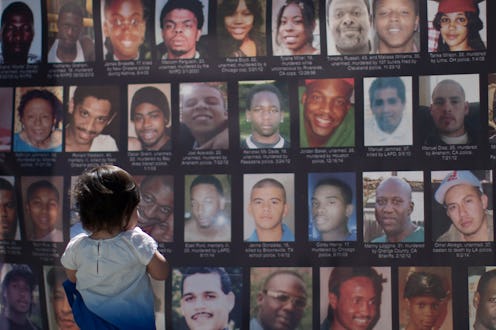News
Alton Sterling's Arrest Record Does Not Matter
The shooting death of Alton Sterling has again sparked justified anger throughout the country, as yet another person of color was killed by police. Sterling, 37, was shot early Tuesday morning outside of a convenience store after police had received a complaint regarding a man selling CDs along the storefront, and allegedly, brandishing a gun at someone. While the investigation is still pending, one thing is clear: People will try to use Sterling's previous arrest record against him. But in the case of his death, that record should not matter in the slightest.
Graphic video evidence filmed by a witness shows Sterling being pinned to the ground by officers before being shot. NBC News confirmed Wednesday that Sterling died from multiple gunshot wounds to the chest and back, according to East Baton Rouge Coroner Dr. William Clark. According to the Baton Rouge Police Chief Carl Dabadie, "When officers arrived, Sterling was armed, and the altercation ensued that resulted in the loss of his life." The Department of Justice is now investigating the situation.
Those who try to justify the killing will likely point to Sterling's previous arrest record. According to the New York Daily News, this includes aggravated battery, criminal damage to property, unauthorized entry, and domestic abuse battery. In 2009, Sterling received a five-year sentence for marijuana possession, as well as for carrying an illegal weapon with a controlled dangerous substance. At the age of 21, he was registered as a sex offender and convicted for carnal knowledge of a juvenile in 2001 and released in 2004.
Sterling's record, obviously, is not clear. But these matters are unrelated to his death. As an individual, selling CDs outside of a convenience store is not a crime for which anyone should be gunned down. And now as a symbol within a larger movement, Sterling, a black man, could have just as likely been killed unjustly, regardless of his previous record. We've seen it with other cases — like Trayvon Martin, who had no criminal record but saw his short 17 years on Earth dug up to be tarnished just the same.
Yet this increasingly common, explicit display of force by the officers, whose body cameras allegedly fell off during the struggle, points not so much to the individual but to a larger problem within the system: the overwhelming and systemic violence inflicted upon people of color by law enforcement in the United States.
According to a study by The Washington Post, nearly 1,000 people were fatally shot by police in the United States in 2015. A disproportionately high amount — 40 percent — of unarmed people killed by police were black men. These statistics paint a harrowing picture of an America that attempts to silence and regulate black and brown bodies through any means necessary, including unjustified force.
That is simply why Sterling's previous convictions don't matter. In a system that already viewed him as less than equal, the target on his back was clear.
Image: Caroline Wurtzel/Bustle (1)
